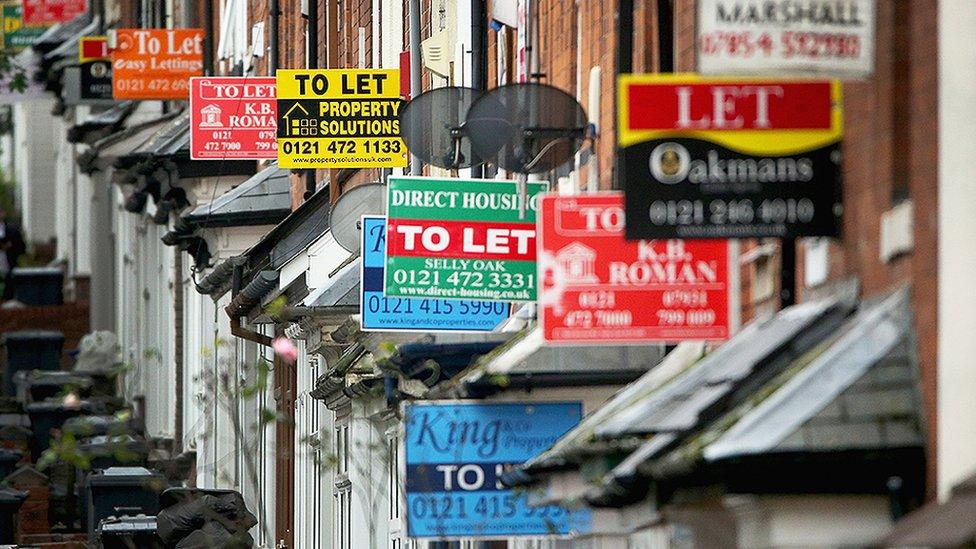Renting: Bidding wars driving up prices for tenants
- Published

Chris Sayers was asked to pay £100 over the advertised price to secure a flat
Would you pay more than the asking price to rent a flat with mushrooms growing out of the bathroom walls?
That was the situation Chris Sayers found himself in when he was hunting for a place to live in London.
He'd gone to view the apartment, in a "brand new, high-rise complex", and the letting agent asked him how much rent he wanted to offer.
"And it was like, well, whatever's on the advert," says Chris.
"And they said: 'Oh, well, we've already had higher than that. So if you want to be taken seriously, you are going to have to do more."
Chris says the agent told him that he'd have to stump up at least £100 a month more than the advertised rent to be in with a chance of securing the property.
Once he was inside, Chris noticed problems: "I have a photo where there were actual mushrooms growing out of the grouting in the bathroom," he says.
That wasn't the end of it.
"Our apartment got a rat infestation," says Chris. "And at all hours of the day you could hear rats scurrying around in the walls."

Chris says he took a photograph of a "mushroom" growing out of the grouting in his apartment bathroom
Chris, originally from Wales, had never heard of bidding wars before moving to London, but was involved in two when looking for a place to rent in the capital.
It's nothing new for people buying a property, but more and more private renters like Chris are finding themselves in battles to outbid rival tenants.
A survey by charity Shelter found more than half a million private renters in England missed out on a place in the last five years because someone else offered more money.
The market is very competitive - according to figures from Rightmove for the BBC, letting agents get about 25 requests to see each available property.
Before the pandemic, it was six.
Campaigners blame this demand for fuelling bidding wars and driving up prices. In Bristol, which has some of the highest rents outside the capital, community group Acorn has spent the last year attempting to get agents to sign a pledge against allowing the practice.
Chair Laura Stone says: "We've had people tell us they've had to take out payday loans to pay a number of months rent up front, just so they can secure the property.
"People are moving further and further out of the city because they just can't afford to live in the areas that they grew up in. It's having a huge effect on people's livelihoods and futures here."

Laura Stone and the Acorn group have led a campaign to stop bidding wars in Bristol
Laura says many tenants are too scared to speak up.
"I think they're terrified of not being able to find suitable homes in the future," she says.
"For renters, obviously your home is never permanent, so you never know when you're going to have to go back to letting agents.
"I think people are worried that that's going to unfairly affect them, especially when there's such a big need for housing in Bristol."
The Labour Party tells Newsbeat it wants the UK to follow New Zealand's lead, which banned bidding wars in 2021. A number of states in Australia have also done the same.
The party's Shadow Housing Minister, Matthew Pennycook, says the practice "pits tenant against tenant" and leaves only one winner - the landlord.
"And so for all those tenants who miss out on a property as a result of bidding wars, they're in a bad position," he says.
"But even those who secure a property by that means, they're often pushed to the financial limits of what they can afford.'
Labour wants the government to add a ban on bidding wars to its renters reform bill - a new law currently going through Parliament that ministers say will crack down on measures such as no-fault evictions.

Bristol's competitive housing market has some of the highest rents outside London
Ben Beadle, from the National Residential Landlords Association, accepts that bidding wars happen but says many problems in the private rental market are due to supply issues.
"You can't go around banning everything," he says.
"What I would say is we need to look at what's forcing people to make these decisions."
Other landlords who've spoken to Newsbeat say the rising cost of living and high mortgage rates mean bidding wars are a way to make sure they can afford to keep renting out their properties.
Interest rates set by the Bank of England are currently at a 15-year high of 5.25%, which pushes up the prices of mortgages for homeowners and landlords.
"At the end of the day, if we have a plentiful supply of homes then bidding wars are a thing of the past and, actually, high rents are as well," Ben says.
In a statement, a government spokesperson said: "It is ultimately for landlords and tenants to agree the amount of rent that should be charged when a tenancy begins.
"Our renters reform bill will deliver a fairer, more secure, and higher quality private rental sector for landlords and tenants."
For more on this story, watch Newsnight on BBC Two at 22:30 GMT and catch up afterwards on iPlayer.

Have you been involved in a rental bidding war? Share your experiences by emailing haveyoursay@bbc.co.uk, external.
Please include a contact number if you are willing to speak to a BBC journalist. You can also get in touch in the following ways:
WhatsApp: +44 7756 165803
Tweet: @BBC_HaveYourSay, external
Please read our terms & conditions and privacy policy
If you are reading this page and can't see the form you will need to visit the mobile version of the BBC website to submit your question or comment or you can email us at HaveYourSay@bbc.co.uk, external. Please include your name, age and location with any submission.


- Published29 November 2023

- Published24 October 2023

- Published5 October 2023

- Published26 July 2023

